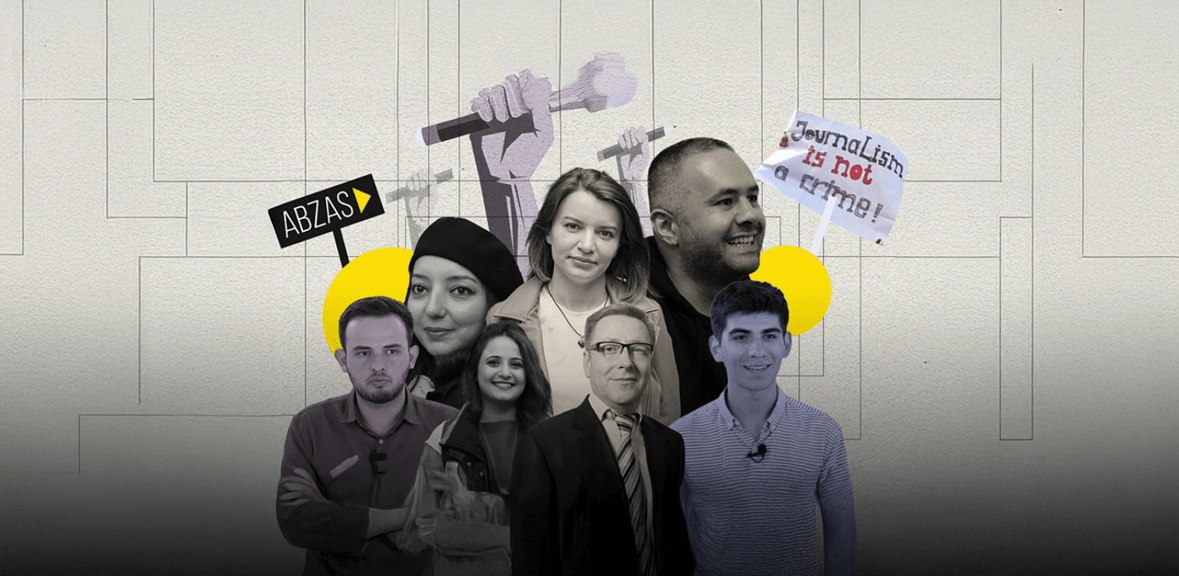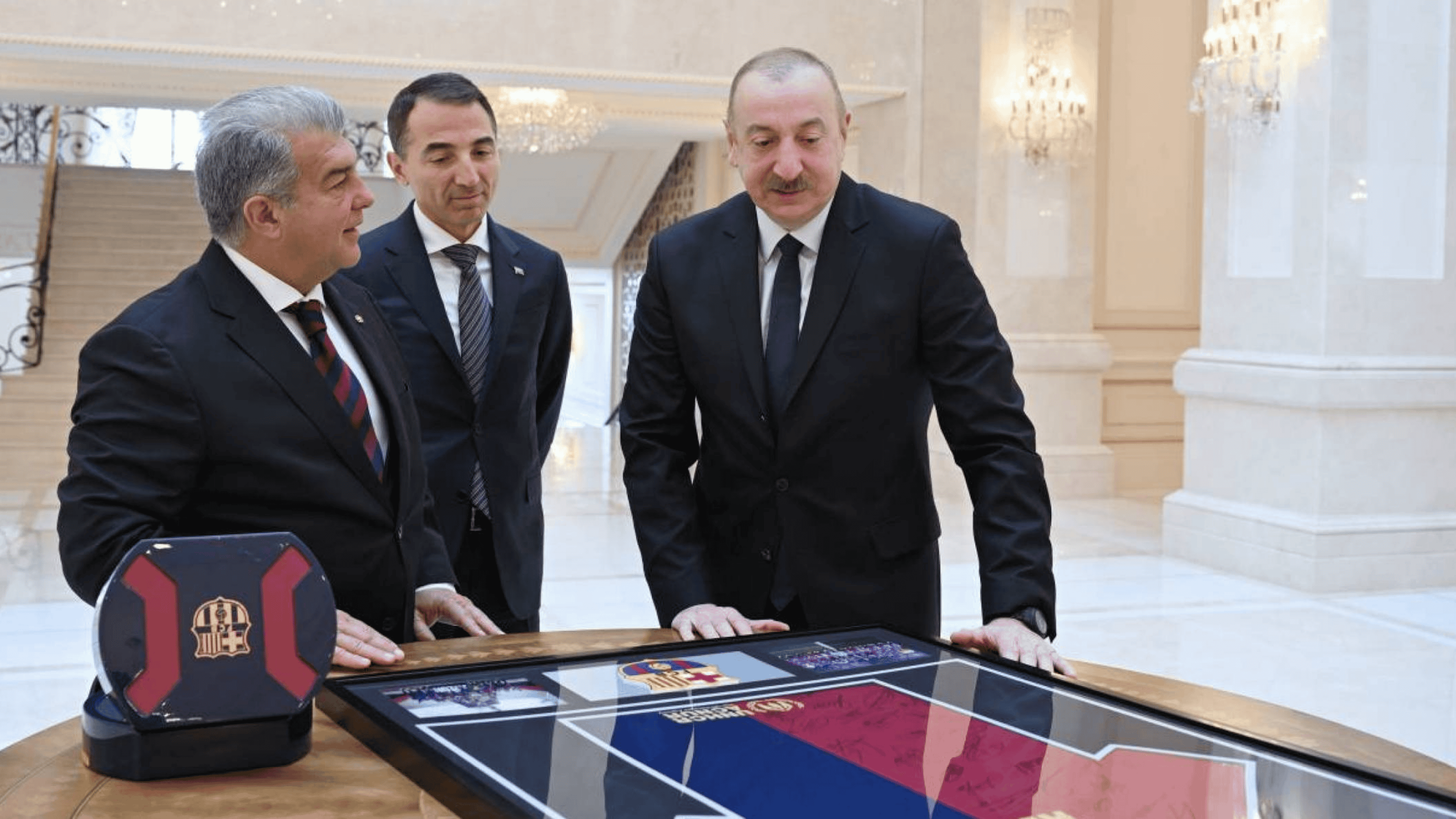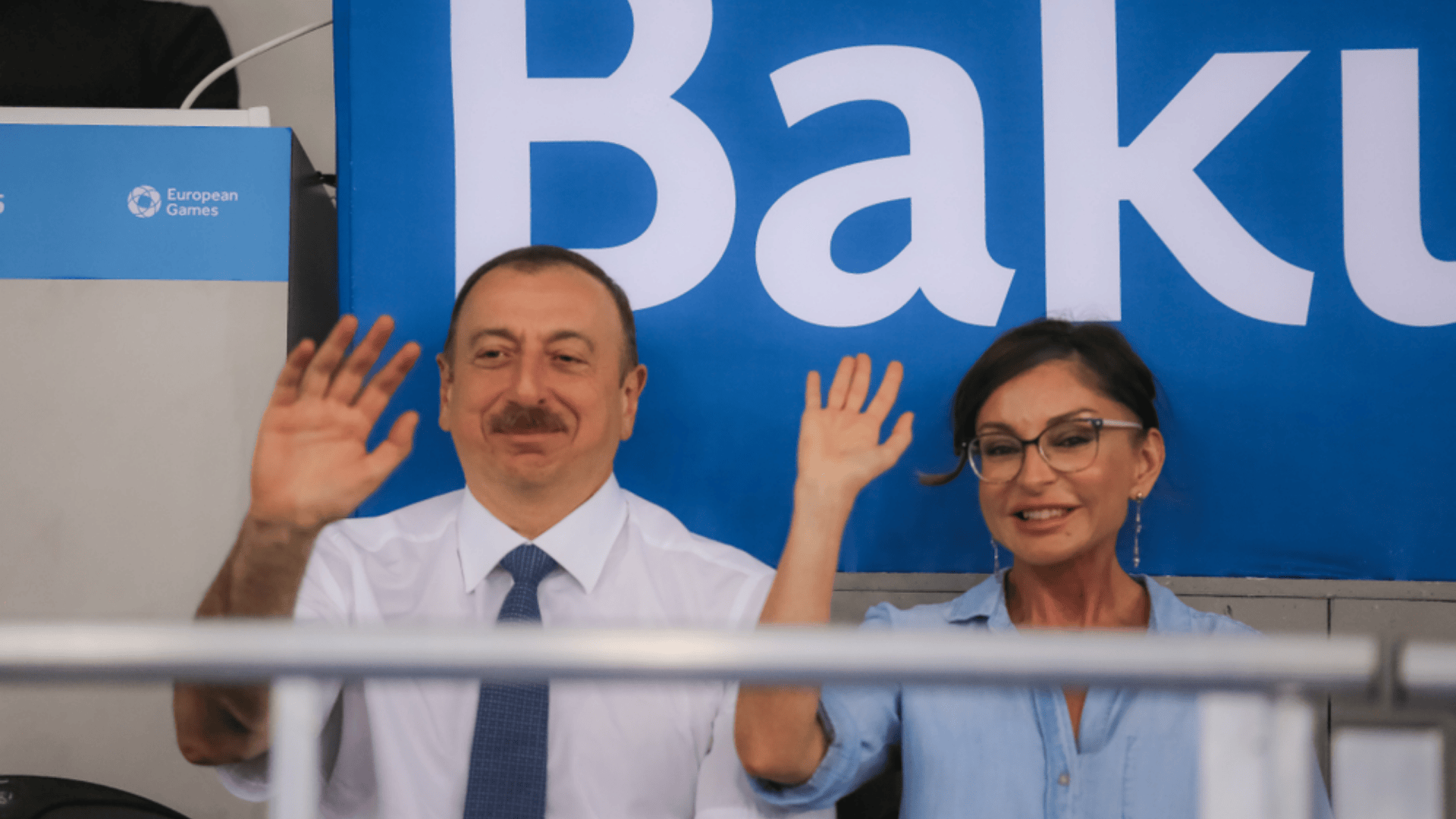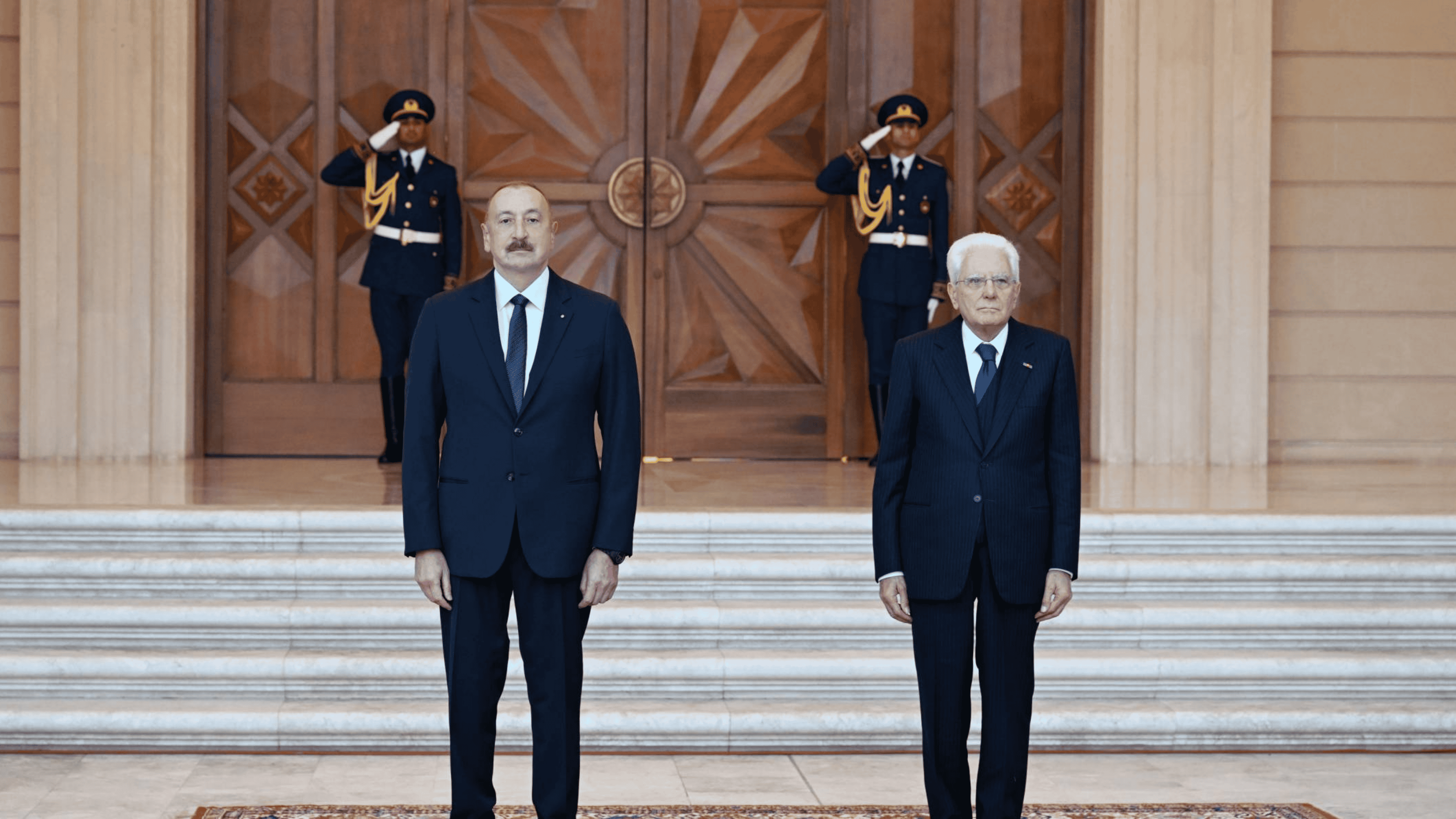Azerbaijani government’s black PR operators: Baku TV, Report and Adnan Ahmadzade
Azerbaijani authorities’ control over media
In Azerbaijan, it has emerged that pro-government media outlets have been spreading information protected by investigative secrecy, targeting independent journalists and outlets. According to reports, these operations are allegedly coordinated by detained oil tycoon Adnan Ahmadzade.
An investigation by Meydan TV reveals the funding and management mechanisms behind platforms such as Baku TV and Report, as well as their use of illegal methods to obtain and distribute information.
These media outlets, which operate under direct government control and receive state funding, regularly run smear campaigns against independent media and journalists. Among their main targets are outlets such as AbzasMedia, Toplum TV, Meydan TV, and individuals connected to them.
By publishing details from ongoing criminal investigations, these outlets accuse journalists of serious crimes, including smuggling, and share information accessible only to law enforcement agencies — presenting allegations as established facts. As a result, they help shape negative public perceptions of independent media representatives facing criminal prosecution.
Tactics against independent media
Under Azerbaijani law, disclosing materials related to an ongoing investigation is strictly prohibited. Even witnesses in criminal cases are required to sign non-disclosure agreements to prevent leaks of investigative information. Despite this, several television channels and news portals routinely violate the law by publishing information obtained during investigations. This practice appears to be part of a broader strategy aimed at discrediting independent media and shaping public opinion in line with the official narrative.
At the forefront of this campaign is Baku TV. In recent months, the channel has aired reports that appear to draw on confidential investigative materials, accusing independent journalists of various crimes. As such cases become increasingly frequent, questions have grown about who funds and controls Baku TV. Investigations have revealed that the channel is backed by powerful but discreet circles with close ties to the authorities.
First signal: Tural Musayibov’s statements about the Bolmart network
One of the first signs of Baku TV’s questionable connections came from comments made by well-known pro-government journalist Tural Musayibov. During the investigation, it emerged that Musayibov — who previously held senior positions in the press offices of state institutions and is known for his loyalty to the authorities — had made a series of statements about the Bolmart supermarket chain, its alleged owner Adnan Ahmadzade, and Baku TV.
According to Musayibov, the large Bolmart supermarket chain is linked to Adnan Ahmadzade through major currency and financial operations. Similarly, another widespread retail network, Rahat Market, is also said to be under his informal control.
Musayibov also shared a specific example from his own experience. While working at Baku TV, he produced a critical report about Bolmart. Shortly after it aired, he received a call from the channel’s management, who told him that Bolmart were “their people” — meaning a company connected to the influential figures behind the channel. The report was immediately taken off the air. According to Musayibov, this incident clearly illustrates the connection between Bolmart and Adnan Ahmadzade. In other words, the existence of taboo topics at Baku TV raised suspicions about the channel’s true ownership.
Musayibov’s statements sparked wide public debate. In a video that circulated on social media, he not only revealed inner workings of the pro-government media environment but also demonstrated that Baku TV is far from independent and serves specific business interests. To verify these claims, investigative journalists began a deeper probe into the issue.
Rahat and Bolmart: the companies’ hidden owners
The investigation uncovered several revealing details about the ownership of the Bolmart and Rahat supermarket chains. According to official financial statements, the sole shareholder of Bolmart LLC is Pro-Mart LLC. As of December 2022, Pro-Mart’s founders included two entities — AZ Fast Moving Business LLC and Unitrade Group LLC. However, under Azerbaijani law, in force since 2012, information about company shareholders and founders is considered a commercial secret. For this reason, it is impossible to determine the true owners of Bolmart and Pro-Mart from official records.
Nevertheless, indirect evidence points to a direct connection between Adnan Ahmadzade and these retail networks. On Bolmart’s official website, photos from the opening of a branch in Nakhchivan show Ahmadzade attending as an honorary guest. In other words, the company’s own promotional materials suggest close ties between Ahmadzade and Bolmart. Furthermore, the pro-government news agency Report featured Ahmadzade in one of its pieces alongside Rahat Market, reinforcing the link. Taken together, these facts suggest that Ahmadzade may be one of the key figures behind Azerbaijan’s largest supermarket chains.
According to Rahat Market’s official website, the chain is owned by ANC Group LLC. Commercial registry data list Adnan Azer oglu Ahmadzade as the company’s founder. The same group also owns one of Baku’s most upscale shopping centres — Port Baku Bazar. In addition, Ahmadzade founded CarsCharge, a company managing a network of electric vehicle charging stations. Collectively, these ventures portray him as a major player in Azerbaijan’s retail and energy sectors.
Adnan Ahmadzade: a brief profile of the oil tycoon and media owner
Amid these connections, it is important to take a closer look at Adnan Ahmadzade. For many years, he held senior positions at the State Oil Company of Azerbaijan (SOCAR) and is widely known in business circles as an “oil tycoon.” On 20 September, Baku’s Sabail District Court ordered his pre-trial detention for four months. Ahmadzade faces charges in a criminal case investigated by the State Security Service, accused of acts undermining economic security and large-scale embezzlement. If convicted, he could face 10 to 14 years in prison.
Investigative journalists claim that Ahmadzade and his family amassed their wealth through unofficial earnings from Azerbaijan’s oil sector. In 2015, in recognition of his contributions to the country’s oil industry, he was awarded the Progress Medal by President Ilham Aliyev.
Ahmadzade’s ties to the media have also drawn attention: recent events suggest that through media outlets he finances, he has sought to protect both his own interests and those of the authorities.
Who owns Baku TV?
Baku TV was founded in 2018 by blogger Orkhan Aliakper oglu Mamedov. The channel’s current director is television journalist Ramin Natiq oglu Jafarov, who previously headed a department at Space TV. However, the actual management of the channel and control over its content is exercised by Elnur Nazim oglu Abdullaev. Thus, while Orkhan Mamedov is listed as the formal founder, Elnur Abdullaev plays the key role in Baku TV’s operations.
According to official records, Baku TV is part of the media holding Global Media Group LLC, which is headed by Elnur Abdullaev, who also serves as its legal representative. Under this holding, a wide network of the country’s major media platforms has been established, including:
- Baku TV — an online television channel
- Haber Global — a TV channel broadcasting in Turkey
- Report.az — a news agency
- Media.az — an online news portal
- Oxu.az — a popular internet resource
- Baku.ws — a news site with entertainment content
- Caliber.az — an analytical media platform
- Kaspi qəzeti — a traditional daily newspaper
This list shows that Global Media Group manages a large media empire with a broad audience and diverse formats, with Elnur Abdullaev serving as its official representative.
A figure from the circle of the former minister
In media circles, Elnur Abdullaev is known as a member of the team of former Transport Minister Ziya Mamedov. On 3 August 2015, by order of Ziya Mamedov, he was appointed head of the State Road Transport Service. Prior to that, he served as general director of Center for Intelligent Transport Management LLC.
Abdullaev thus entered the media sphere from the state administration system and maintains connections in the upper echelons of power. Media reports have also highlighted his close ties with the former minister’s son, Anar Mamedov. These relationships likely helped strengthen his position in media and manage large-scale projects.
In 2020, Abdullaev was awarded the Honorary Diploma of the President of the Republic of Azerbaijan for his contributions to the development of national media, reflecting both his influence and official recognition.
He is also considered one of the closest associates of Adnan Ahmadzade.

It is known that Orkhan Mamedov also maintains close personal ties with Adnan Ahmadzade, and all three — Ahmadzade, Elnur Abdullaev, and Mamedov — are closely connected, as evidenced by their social media activity. For example, on his Instagram page, Mamedov thanked his “older brother” Abdullaev, highlighting that he is the one “behind the scenes of Baku TV’s success.” This further confirms that, while the channel is formally owned by Mamedov, the real driving force is Elnur Abdullaev — and, through him, Adnan Ahmadzade.
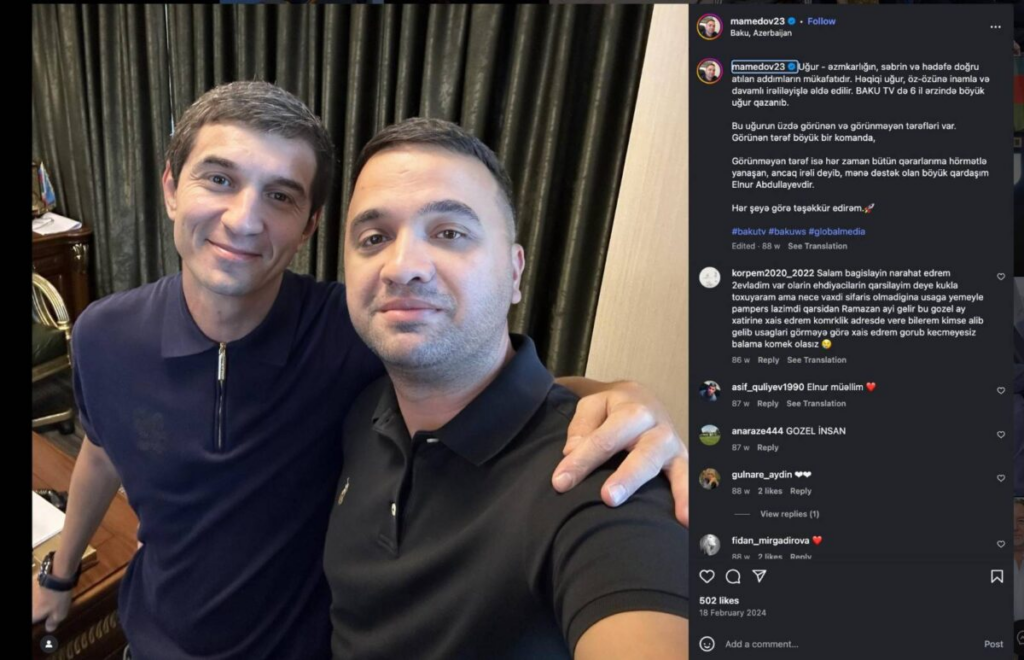
The facts outlined above indicate that a circle of individuals connected by family, friendship, and business ties has formed around Baku TV. Figures such as Adnan Ahmadzade, Elnur Abdullaev, Orkhan Mamedov, and others appear to operate as an informal alliance with shared interests in business and media. On one hand, these connections help manage large business empires — including supermarket chains and energy companies — and on the other, they provide influence over public opinion through media structures.
Silence of Report agency and its ties to SOCAR
One of the outlets within this media network is the news agency Report. It presents itself as an independent news source, claiming to cover events in Azerbaijan and around the world promptly. However, recent events have shown that Report is not fully independent. A striking example is the arrest of Adnan Ahmadzade. Despite the case attracting widespread attention from local and international media, Report did not publish any news about his detention or the opening of a criminal case against him, even though other outlets extensively covered the story. This silence is seen as evidence of vested interests linked to Ahmadzade.
Notably, even at the time of its founding, some media outlets speculated about the source of Report’s funding. One pro-government publication suggested that Report had been established with investment support from SOCAR. This claim is further corroborated by a study published in 2014.
According to Müsavat, the main sponsor of Report.az is Anar Aliyev, head of SOCAR’s overseas trading division. At the agency’s inception, journalists were offered very high salaries, and the office and car fleet were fully provided. These details point to substantial state and oil-sector investment in the project. If Report was indeed financed by SOCAR and its representatives, it helps explain why a high-ranking SOCAR official like Ahmadzade could exert influence over the media outlet.
Report’s decision to ignore such a significant event as Ahmadzade’s arrest is unlikely to be coincidental. Instead, it underscores the existence of forces in the country’s media landscape that shape the agenda to serve their interests. When it suits Ahmadzade, media outlets close to him remain silent; independent outlets perceived as critical voices, by contrast, become targets of discrediting campaigns, sometimes through illegal means.
Business, media and power: a closed triangle
The facts outlined above represent just part of the obstacles to media independence in Azerbaijan. On one hand, wealthy businessmen and oligarchs exploit gaps in the law and the culture of secrecy to exert control over the country’s leading media outlets. On the other hand, these structures serve the political interests of the authorities and are used to suppress competing or critical voices. As a result, an informal but stable alliance between media, business, and power has emerged.
The cases of Baku TV and Report demonstrate that some platforms, which formally present themselves as independent, are in fact influenced by certain oligarchs and high-ranking officials. This influence takes the form of direct financial support, personal and business relationships, or political patronage. Consequently, the objectivity of the information they disseminate is compromised, and instances of illegal disclosure of investigative materials go unpunished.
The findings from this investigation underscore the urgent need for reforms and greater transparency in Azerbaijan’s media sphere. The lack of information about media owners and funding sources makes public oversight impossible and erodes trust in journalism. Meanwhile, the illegal publication of investigative materials undermines the rule of law and negatively affects the course of justice.
In this context, the hidden network of ties and interests surrounding Baku TV and Report illustrates the convergence of major business interests and political power in Azerbaijan’s media landscape. This situation transforms the press from a “fourth estate” into a tool for specific centers of influence.
Campaigns to discredit independent media and manipulate information harm pluralism and democratic values in the country. Addressing these challenges requires ensuring genuine media independence, the equal application of the law, and strengthened public oversight.










